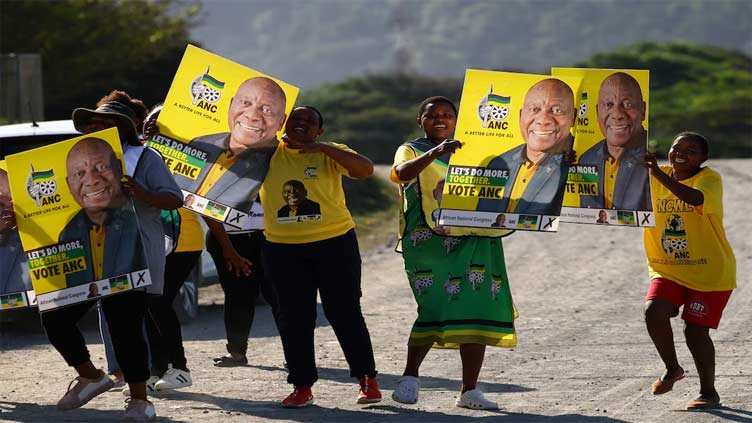In rural South Africa, voters weigh frustration and ANC loyalty

World
The government has built around 3 million new houses for poor families
QUNU, South Africa (Reuters) - In Nelson Mandela's hometown of Qunu there has been no running water since 2016, jobs are scarce and crime is on the rise as unemployed young men and women while away their days drinking beer.
Support for the ruling African National Congress remains strong among older voters here ahead of South Africa's elections on May 29, but cracks are showing among those too young to remember the days when Mandela and his party vanquished apartheid.
"I will vote for the ANC until I die," 65-year-old Mzwandile Mthembu told Reuters. He has no power in his concrete shack, but gets a pensioners' grant and is grateful for his freedom. "It's not enough," he said. "But we had nothing before."
Across the road, 37-year-old Lungile Xozwa said he had had enough of the old guard and would be voting for the opposition.
"Mandela is gone. Now it's our time," the community health researcher said in his small, sparsely furnished house with a pit toilet in the front yard.
The challenges in Qunu in Eastern Cape province are echoed across South Africa where unemployment is near a record high, murders are rising and basic services including electricity are unreliable.
Widespread dissatisfaction is expected to cost the ANC its majority in the May vote for first time since 1994 and force it into coalition, according to polls and political analysts.
Some opinion polls have put overall ANC support as low as 39%, though it is still on track to get twice the votes of any other party.
More recent surveys show it regaining some ground. "The ANC is creeping up," Susan Booysen, research director at the Mapungubwe Institute for Strategic Reflection, said.
Over the years, however, election trends show the party's support has fallen off, particularly in urban areas. In 2021 municipal elections the ANC's share of the vote in big cities such as Pretoria and Johannesburg slid to roughly one-third - its worst ever result.

In largely rural provinces like the Eastern Cape, where the ANC won 63% in 2021, the party's traditionally strong support is being challenged by a generational divide.
"A lot of young people here struggle to find jobs. Some have never been employed for 30 years," Qunu chief Nokwanele Balizulu told Reuters. "Then they say to their mothers, 'This ANC that you say is yours, what has it done for you?'."
'DOING SOMETHING THAT WAS NEVER DONE'
There are few paved roads in Qunu, where women fetch water from a stream and shepherds herd sheep.
The region was once among the small territories the apartheid government allocated to Black people, until the ANC helped usher in multi-racial democracy in 1994.
When the ANC came to power it faced the mammoth task of extending services to the roughly 87% of citizens who were non-white. While it has had notable successes, progress has been patchy.
About 90% of South African households were connected to electricity in 2022, compared with 54% in 1994, according to household surveys, but power cuts have worsened for everyone.
The government has built around 3 million new houses for poor families, according to the Department of Human Settlements, but there are some 2.5 million households on the waiting list.
The ANC says it needs more time to finish the job, though it acknowledges mistakes during its three decades in power.
"Those (mistakes) happened because we were doing something that was never done in our country," ANC Deputy Secretary-General Nomvula Mokonyane told Reuters in an interview in March.
Qunu got electricity and running water in the 1990s, then lost the water around 2016 as the system was not maintained. Access to water has been declining in Eastern Cape and Limpopo - the ANC's biggest strongholds - since 2014, according to a 2022 government report.
"I see what the ANC is doing for other communities but here it's scarce. We don't have water and we have gravel roads. So let's try another party," said Phila Gogozayo, 24 and unemployed. She said she will vote for the leftist Economic Freedom Fighters.
'BETTER THE DEVIL YOU KNOW'
Some disaffected youth in Qunu told Reuters they had not registered to vote or were still undecided, which could limit the impact on the ANC's support.
Nationally, no single opposition movement has emerged to capture the youth vote, independent analyst Ralph Mathekga said.
"The domination of the ANC in society is not just political, it is social," he said. "That ... is not easy to overcome."
The two biggest opposition parties are the Democratic Alliance, a pro-business party seen by many as representing white privilege - a charge it denies - and the Economic Freedom Fighters. There are dozens of smaller movements.
On a Saturday in May a handful of women sat in the grass near a bar in Qunu, their backs against a chain-link fence.
"The only thing we do is drink alcohol because we can't find jobs," said Thabisa Madiba, an unemployed 35-year-old.
Despite that she still planned to vote ANC. "Better the devil you know than the devil you don't."


